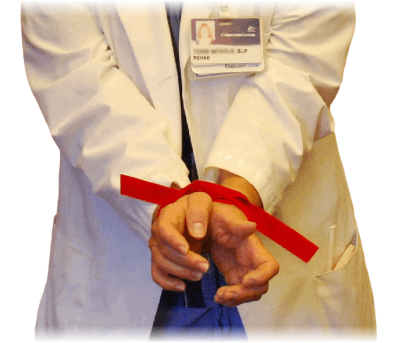Research shows brain-plasticity aids recovery from Stroke & TBI
It's never too late to recover speech & language.
They told me the window for my recovery had closed.
You’ve plateaued and there’s nothing more we can do for you right now."
Stroke and TBI survivors talking to me (your author)
I’ve had lots of stroke and brain-injury survivors recount similar stories. And then their therapy ended.
But, it’s a myth.
The origin of this myth is complicated. I don't think any speech therapist is saying "No patient can improve beyond X months". But that's what patients hear. Some survivors truly can't make progress, either because their deficit it too severe, or they are not motivated to do the work to improve. But that's on a case by case basis, not because there is some arbitrary "recovery window".
Here’s what Dr. Jim Lynskey, PT, Ph.D has to say in Stroke Smart magazine.
“In truth, study after study shows that the so-called "window of recovery" does not exist. Although the time shortly after a stroke occurs is important, most stroke survivors see the effects of recovery for the rest of their lives. Continuing physical, speech, and occupational therapy for years after a stroke can still yield positive results.” (emphasis added)
The National Institutes of Neurological Disorders and Stroke (part of the NIH) :
For some stroke survivors, rehabilitation will be an ongoing process to maintain and refine skills and could involve working with specialists for months or years after the stroke."
National Institutes of Neurological Disorders and Stroke (part of the NIH)
Brain-rewiring, called Brain Plasticity, continues into Adulthood
Scientists have discovered that the ability of the Brain to “rewire” itself doesn’t end in childhood, as was once believed. I explained Neuroplasticity in plain-English previously.
“Today we recognize that the brain continues to reorganize itself by forming new neural connections throughout life. This phenomenon, called neuroplasticity, allows the neurons in the brain to compensate for injury and adjust their activity in response to new situations or changes in their environment.” writes Stephanie Liou at Stanford University.
Insurance Catch-22
Many get less therapy than insurance will provide. What you can do to get more.
We know the brain can continue to recover, even years later. So why do I hear from caregivers that they are being told the patient plateaued and (most importantly) insurance has not pre-authorized a follow-up visit to assess that expected readiness for more therapy? If the expectation from the insurance company is:
You need to go home and practice until you’re ready for more therapy,Shouldn’t the insurance company pre-authorize the follow-up to confirm their assumption?
Yet, no caregiver I’ve ever spoken to has had that follow-up prescheduled. I don't think this is anything nefarious. It's just a flaw in the system. This may explain why therapy more often ends due to lack or progress rather than exhausting benefits. The data from speech therapists confirms that therapy ends 400% more often due to lack of progress than lack of benefits.
Insurance is prepared to provide more benefits if you can make more progress.The root cause of this seems to be the policy of many insurance companies that they will pay for additional therapy only when the current therapy produces results. That seems like quite a reasonable policy aimed at putting resources where they will do the most good. That’s certainly not the effect it has.
Patients need 2 to 8.8 h of therapy per week
 A
review of research studies indicates that treatment of 8.8 hours of week
is effective. Conversely, 2 hours per week is not effective.
A
review of research studies indicates that treatment of 8.8 hours of week
is effective. Conversely, 2 hours per week is not effective.
Code, C, Petheram, B 2011.
Most caregivers and patients I speak with tell me insurance is providing 3 or fewer sessions and most sessions are 45 minutes. Do the math. That's maybe 2.25 hours a week.
In a peer-reviewed medical journal article: Code & Petheram report:
Average hours of treatment for aphasic people in the developed world ranges between 1–5 hours per week, with a great deal of variability, although recent research suggests that intense treatment of 9 hours per week over a relatively short period is needed in order to be effective. It is concluded that there is a significant gap between what the research suggests is the appropriate amount of treatment and actual provision throughout the English-speaking world.
(Code and Petheram, 2011)." (emphasis added)
The same article reported a study that showed two hours was not enough weekly treatment to be effective. These are statistical averages and every patient is different. Some may need less or more than the average. Ask your therapist how many hours of practice you need.
Speech Therapy May Not Be Appropriate
Just as there is no rule that says recovery stops after X months or years, there is no guarantee that a patient will make progress. Some patients don't have a good "starting point" for therapy. Perhaps they have no language whatsoever and have not made progress after 20 or 30 hours of speech therapy. Or patients may prefer to spend their time on something other than speech therapy. I tell caregivers that stroke recovery like the old TV Detective Shows: You have to show Motive and Opportunity. If the patient is motivated then the caregiver can provide the opportunity. Some patients seem unmotivated but are actually just blocked by some obstacle (fear of failure, difficulty in getting to therapy, etc.). We can remove obstacles, but we cannot provide motivation. I'll cover that in an upcoming article of these Rehab Resources.
Your speech therapist's hands are tied
 Your
therapist has no control over the insurance company's policies. They
became therapists to help you, but their hands are tied. The
insurance company decides what they will pay for. If they'll pay for
only 10 sessions, your treatment ends in 10 sessions. You could
pay out-of-pocket but therapists understand that most people can't
afford that. If you pulled out your checkbook it would cost $100 to $400
per extra hour of therapy. FYI, I'll be covering some
suggestions for much
more affordable therapy in a future Rehab Resource.
Your
therapist has no control over the insurance company's policies. They
became therapists to help you, but their hands are tied. The
insurance company decides what they will pay for. If they'll pay for
only 10 sessions, your treatment ends in 10 sessions. You could
pay out-of-pocket but therapists understand that most people can't
afford that. If you pulled out your checkbook it would cost $100 to $400
per extra hour of therapy. FYI, I'll be covering some
suggestions for much
more affordable therapy in a future Rehab Resource.
Avoid the Plateau & get more therapy
If the patient gets the additional 6 or 7 hours of weekly practice the research shows is needed, then they could make enough progress to avoid the problematic plateau and avoid therapy ending prematurely. It's a double-win: you make more progress and get more therapy, increasing the odds of even more progress.

So, now we know:
-
Recovery is possible even years later
...if the patient can get enough therapy, but... - The Insurance Catch-22 means that patients often do not get enough therapy.
- You just need to find a way to get more treatment.
How to recover faster, and get more speech therapy
So, if insurance won’t pay for additional therapy unless you make progress, but doesn’t provide enough therapy to make that progress, how can you get the extra treatment to make the progress insurance is looking for?
I created a free Speech-Language Course to help you do exactly that. Or you can get a free therapy plan that includes up to 9 weeks of home speech therapy.
How to get your 9 hours per week
- The Speech-Language Course I created includes free exercises (from therapists) for speech & language practice at home.
- Identify your survivor's speech-language deficits
- Where to get speech therapy for $2 a session
- All this an more in your Speech-Language Course
Every day is an opportunity for recovery. Don't miss a single day.
- Surprising neuroscience discovery that makes recovery possible at any age.
- Why embracing failure leads to faster recovery.
- Unlock your survivor's communication needs in 4 steps.
- How to improve speech & language at the kitchen table.
Clay Nichols
Co-founder of
MoreSpeech and
Bungalow Software
for unlimited speech therapy at home and in the clinic.
 For
3 decades, Clay has helped patients, caregivers and speech pathologists
with speech & language software. He is not a speech-language
pathologist.
For
3 decades, Clay has helped patients, caregivers and speech pathologists
with speech & language software. He is not a speech-language
pathologist.
© 2025 Bungalow Software